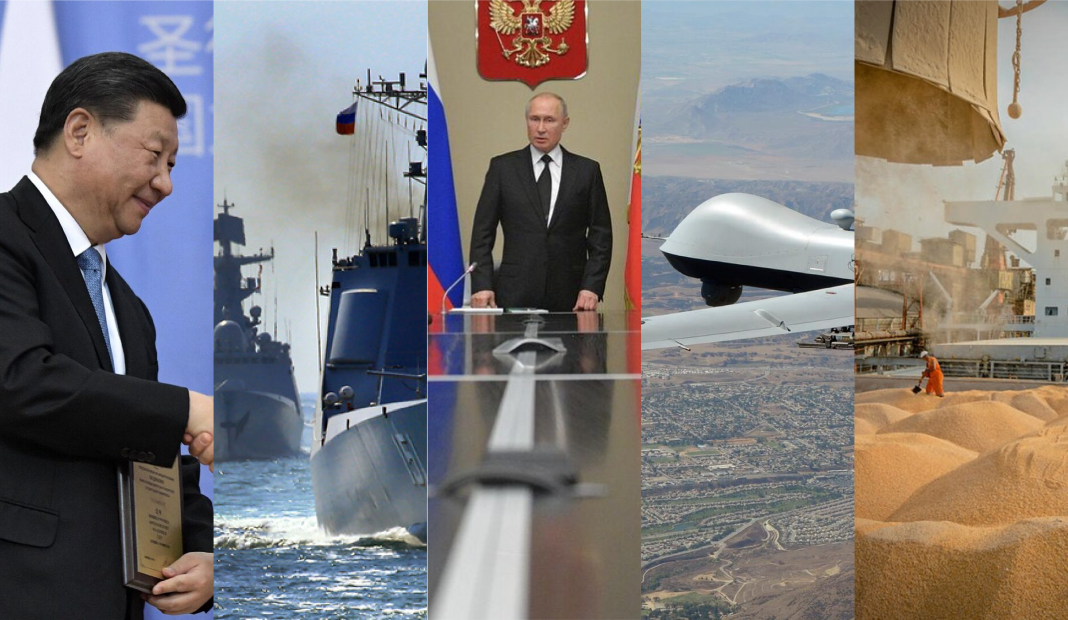This report describes the key events that had an important impact on the political, economic and social processes inside Russia.
Based on the results of the past week, the following key events can be brought to attention:
- Russia is preparing for Xi Jinping’s visit to Moscow, one of the key events determining the further development of the situation in the geopolitical arena. This visit plays an essential role for Ukraine as well. In fact, the whole of last week was devoted to meetings and conferences in preparation for the state visit of the Chinese leader.
- Putin once again declares his readiness to negotiate with the West. As before, he is not ready to consider Ukraine a separate issue and insists on a comprehensive discussion of the new world order. He sees Beijing as the central mediator in this process, which is ready to take on this role and become more actively involved in the negotiation process.
- In Russia, there is increasing tension among representatives of big business, who are increasingly demonstrating dissatisfaction with Putin’s policies and another attempt to tighten the screws. According to Ascolta, this situation could be more explosive for Putin than regional separatism or social riots. In the near future, we should expect an open confrontation between individual Russian oligarchs and the authorities.
During 13th-19th of March the following topics were the most relevant for Russia:
1. Continuation of the Black Sea Grain Initiative
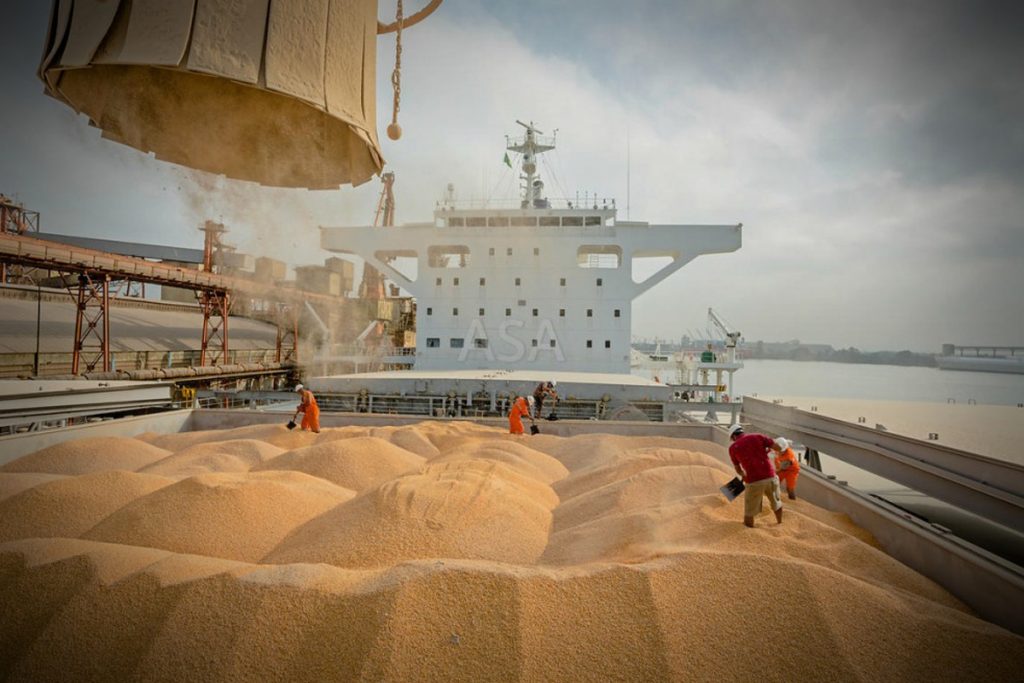
One of the main events of the past week, both in Russia and the geopolitical arena as a whole, was the discussion of the extension of the Black Sea Grain Initiative, which was first signed on July 22, 2022. The action of next extension of the initiative expired on March 18 and caused specific concerns among several states. By the end of the week, it became finally known that the “grain deal” could still be extended. However, disputes flared up in the public plane about the deadline for a new extension since Russia announced that the new agreements would be valid for the next 60 days, and the Ukrainian side called the term 120 days.
Timeline:
- On March 13, negotiations between the Russian Federation and the UN on extending the “grain deal” began in Geneve.
- Russian Deputy Foreign Minister Sergei Vershinin said that the Russian side has no objection to extending the Black Sea Grain Initiative after it expires, but only for 60 days.
- Ukrainian Deputy Prime Minister Oleksandr Kubrakov said he disagreed with Russia’s proposal to extend the grain deal by only 60 days since the original agreement on the Black Sea initiative provides an extension of at least 120 days.
- On March 14, Russian Deputy Foreign Minister Alexander Grushko announced that the “grain deal” had been extended on the same terms. According to him, “the package nature” of the agreement was confirmed, including lifting sanctions on Russian agricultural exports. At the same time, he did not comment on the timing of the extension of the “deal”.
- Putin’s spokesman Dmitry Peskov said that extending the “grain deal” is a “goodwill gesture” on the part of the Russian Federation.
- The office of UN Secretary-General António Guterres said that the grain deal provides a 120-day extension, but now the UN is focused on continuing its work in principle.
- Stéphane Dujarric, a spokesman for the UN Secretary-General, said the UN does not have all the leverage to resolve problems with Russian fertiliser and food exports in 60 days.
- On March 16, the Russian Foreign Ministry confirmed extending the grain deal for 60 days. On March 17, Dmitry Peskov made a similar statement.
- On March 17, Turkish President Erdogan announced that the grain deal had been extended. At the same time, Turkish Foreign Minister Mevlut Chuvasoglu said that Ankara would seek to extend the “grain deal” for more than 60 days, for which Russia agreed to prolong it.
- On March 18, Deputy Prime Minister of Ukraine Oleksandr Kubrakov announced that the grain deal had been extended not for 60 but for 120 days. Later, the Turkish Habertürk TV channel announced similar information.
- Russian Foreign Ministry spokeswoman Maria Zakharova, in response to the Ukrainian side’s statement, once again said, “Russia has notified all participants that the deal has been extended for 60 days.” Also, the Russian Foreign Ministry published a letter to the UN leadership on the agreement to extend the grain deal.
Outcomes and outlook:
The extension of the “grain deal” has become one of the main topics of recent weeks. Russia insisted it fulfilled its obligations under the deal, but the West disagreed with the promised easing sanctions on Russian agricultural products and mineral fertilisers. Long debates have shown that the West does not want to make concessions and demands that the “grain deal” be carried out by Russia almost unilaterally. The only factor holding Russia back from withdrawing from the “grain deal” is the fear of losing an ally in the face of Turkish President Recep Tayyip Erdogan.
It is for this reason that Russia agreed to extend the deal for only two months – on May 14, presidential elections will be held in Turkey, and if Erdogan loses, Russia can completely withdraw from the “grain deal” and even intensify hostilities in southern Ukraine (one of the conditions that informally Erdogan voiced in negotiations with Putin, this is a guarantee of relative security for the Tatars and Gagauz in the Odesa region). Thus, from the point of view of Russia, the “grain deal” is an element of pressure on the will of Turkish citizens (primarily on the country’s elites) in the course of preparations for the elections. It has long been known that the deal is initially speculative and that Ukrainian grain only minimally goes to the countries of Africa and Asia. But Turkey remains the central intermediary and regulator of sending grain flows and the main beneficiary. The possible coming to power in Turkey of pro-Western forces could lead to a severe economic blow from Russia.
Notably, on March 14, Turkey resumed the transit of sanctioned goods to Russia, which was limited in early March. This fact also confirms Turkey’s high interest in extending the “deal” and trying to find new levers of pressure on Russia.
At the same time, according to Ascolta, during the negotiations, the parties agreed on non-disclosure of the terms of the deal extension. At the same time, the statement of the UN representatives is quite remarkable, in which they note that in 60 days, they are unlikely to have time to fulfil all the requirements of Russia to lift sanctions on agricultural products. The primary condition for the next transaction extension is implementing this task within the last 60 days. And in case of successful fulfilment of the requirement, Russia will automatically extend the deal for another 60 or more days.
2. Vladimir Putin’s trip to the Republic of Buryatia
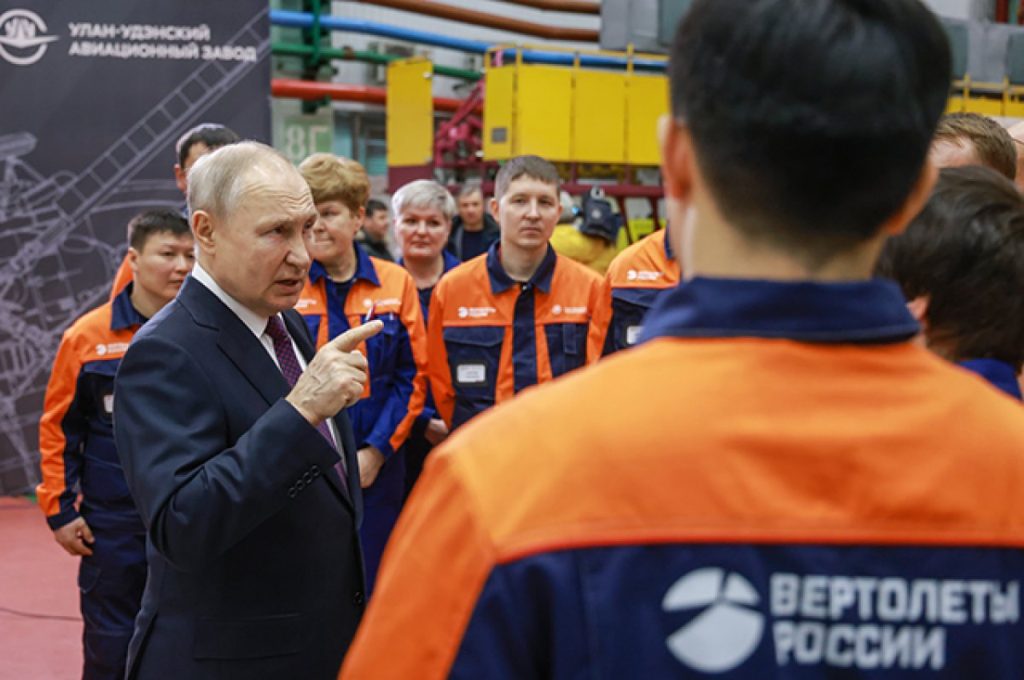
On Tuesday, March 14, Vladimir Putin paid a working visit to Ulan-Ude, where he met with the Governor of Buryatia, Alexei Tsydenov. Also, he visited a local aircraft factory, where he talked to employees and lectured them on the situation in the geopolitical arena.
Putin’s key theses:
- “It turned out that the geopolitical interests of our, as I said earlier, “partners” turned out to be much more important for them than ideological contradictions with the former Soviet Union. And right there – you know all this well – pressure began to rock Russia itself. They began to create a fifth column inside to shake up the domestic political situation; they sent hordes of international terrorists against us, who began to operate in different regions of the country, including, above all, in the North Caucasus. That’s all we went through. Terror attacks inside the country – it was all before our eyes. They began to work actively around the perimeter.”
- “After World War II, those who collaborated with Hitler, with the Nazis, fled to Europe, most of all to the USA, to Canada from Ukraine. And, of course, it was such an anti-Russian base. So they gradually began to feed it, develop it, and create “anti-Russia” from Ukraine. But we have been patiently trying to establish relations with the modern Ukrainian state for decades.”
- “We have been trying for eight years to persuade our so-called partners to solve the problem of Donbas peacefully. Now it turns out they simply led us by the nose and deceived us – directly, publicly, they do not hesitate to talk about it. And all of this led to today’s situation.
- “To bring peace closer, stability closer, we, of course, need to show the consolidation of our society; there must be composure.”
- “Russia has passed a critical stage in its development this year. Maybe this is the most important result of 2022. What is it? We have multiplied our economic sovereignty. After all, what was our enemy counting on? That we will collapse in two or three weeks or a month – that’s what was calculated.
- “It turned out – for many of us, and even more so for Western countries – that the fundamental foundations of Russia’s stability are much stronger than anyone previously thought about it.”
- “You just mentioned GDP – this is everything that a country produces during the year if we take it in annual terms. We were talking about Ukraine, where the GDP just collapsed by 40 per cent. This is official data. In fact, I think more.”
- “We have a deep bow to agricultural producers this year – over 155 [million tons of grain were harvested], the Minister of Agriculture reported to me two days ago, somewhere around 153 or 155 million tons already. This is generally a record for the entire modern history of Russia, and in Soviet times – of course, within the framework of the RSFSR – there was nothing like that.
Outcomes and outlook:
Vladimir Putin’s working trip to Ulan-Ude is also part of the presidential election campaign, which, according to Ascolta, unofficially began at the end of February. Recently, Putin and his entourage have been paying great attention to the issues of Siberia and the Far East. Obviously, in the context of the deepening conflict with the West, the process of strengthening a powerful rear is essential for the Russian leadership. At the same time can become a connecting bridge between Russia and China. It is no coincidence that Putin inspects enterprises producing military and dual-use products.
Among other things, a severe personnel outflow from Siberia, the Urals and the Far East to Moscow are predicted (among the first candidates is the governor of the Sverdlovsk region, Kuyvashev, the governor of the Kemerovo region Sergey Tsivilev, the head of the Republic of Buryatia Alexei Tsydenov). Personnel who have gone through hostilities and worked in the occupied territories will be offered in their place (the appointment of the acting governor of Chukotka, Vladislav Kuznetsov, who previously worked in the “government” of the self-proclaimed “Lugansk People’s Republic”), was indicative.
Also, this trip is a bonus for the heads of the federal districts, Anatoly Seryshev and Yuri Trutnev (Buryatia, which Putin visited, remains a disputed region between the Siberian and Far Eastern Federal Districts). It is quite possible to predict Trutnev’s personnel increase, which is gaining more and more administrative weight, combining the post of a plenipotentiary representative of the president in the Far Eastern District and vice-premier of the government. It is also possible that Anatoly Seryshev, whom many have lost sight of, will be returned from Novosibirsk to Moscow – Seryshev may well be at the head of one of the law enforcement agencies. For Putin, a trip to Ulan-Ude is a signal to the elites of remote regions that they have not been forgotten.
Most likely, we should expect financial injections into the economy of the Urals, Siberia, the Far East and Transbaikalia. Against this background, frequent statements by politicians about the possibility of transferring the capital of the Russian Federation to Siberia is also a signal that is read positively by the population of the Russian hinterland.
3. The law on fakes against the so-called “SMO“
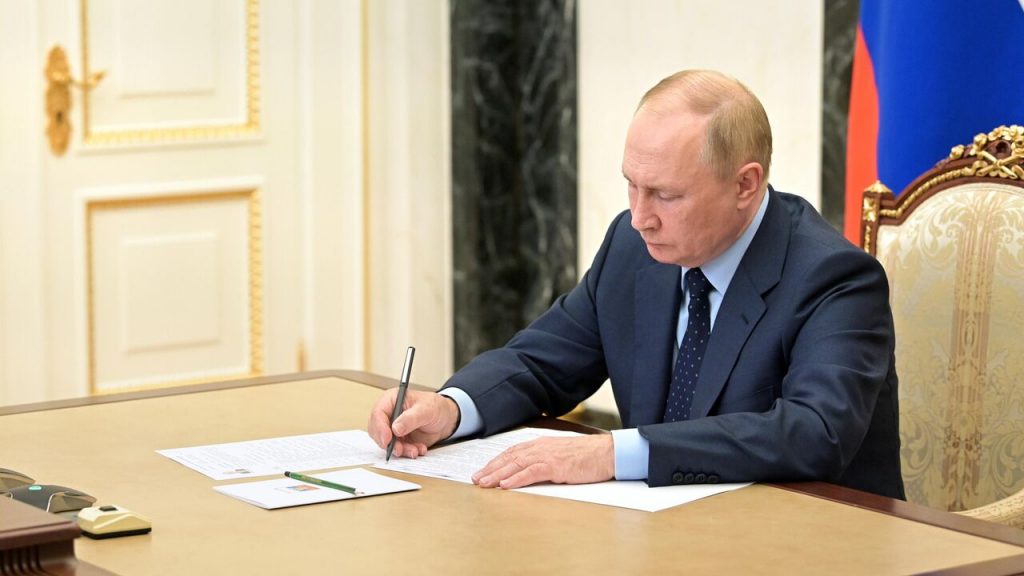
On Saturday, March 18, Vladimir Putin signed a law on penalty for discrediting and fakes about the participants of the so-called “SMO“. The document appeared on the official portal of legal information, and the corresponding amendments were made to the Criminal Code of the Russian Federation. The article about fakes concerning the RF Armed Forces now applies to volunteers. The maximum punishment for it is up to 15 years in prison. Discrediting the participants of the SMO may result in up to 7 years in prison.
Outcomes and outlook:
The law on fakes is primarily intended to suppress critical sentiments in society regarding an unjust war, war crimes on Ukraine’s territory, and many victims. All those who disagree with the so-called “special military operation” can fall under this law. Moreover, even those who disagree with the definition itself, according to which Russia does not wage war but only conducts a special operation designed for several days but dragged on for more than a year.
From this moment on, we can say that any criticism of the war in Ukraine will be under a severe taboo – up to real prison terms (we can expect show trials designed to discourage criticism of the authorities’ actions).
Of course, the main task of this law is to completely crush any manifestations of disagreement with the official positions of the Kremlin. At the same time, it should be assumed that this law may be effective for the Russian authorities even after the war’s end when support for military personnel decreases both in society and on the part of the state. This law is Putin’s conditional protection from external and internal criticism of his actions concerning Ukraine.
4. An American UAV MQ-9 Reaper downed over the Black Sea
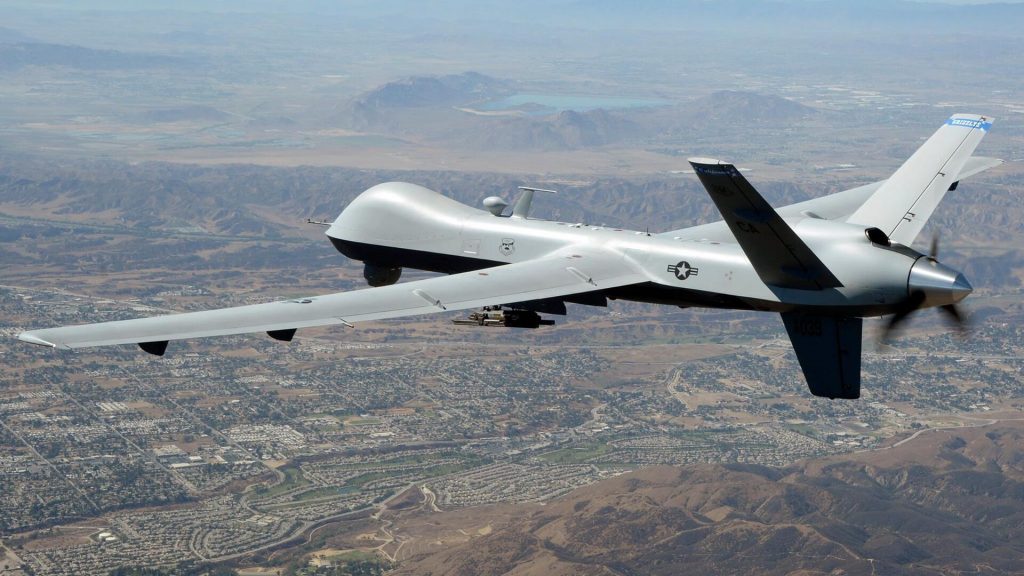
On Tuesday, March 14, several American publications reported that an American reconnaissance UAV MQ-9 Reaper crashed in the Black Sea. Later, the US European Command said that a Russian Su-27 collided with an American MQ-9 drone over the Black Sea, causing the drone to crash into international waters. This situation caused active discussions in the world media, and, despite the absence of an escalation in relations between Moscow and Washington, this event still deserves a deeper analysis.
Timeline:
- The US military said that Russia shot down the UAV, and Joe Biden has already been informed about the details of the incident.
- Later, US Air Force European Command said the drone crashed due to “reckless and incompetent” actions by the crew of a Russian Su-27 aircraft in international waters. This happened at 7:03 am European time. According to the American side, two Russian Su-27 aircraft intercepted the drone. One of them hit the MQ-9 on the propeller.
- The US State Department has announced that it will contact Russia regarding the downed US UAV incident in the Black Sea.
- On March 15, Russian Ambassador to the US Antonov, who was previously summoned to the State Department, gave the Russian version of the US UAV events: “I want to stress that the Russian pilots acted very professionally. There was no contact or use of any weapons by our fighters. And this unmanned vehicle, having made a sharp turn, crashed into space. The craft was flying with its transponders turned off, and it entered an area identified as a [so-called] “special military operation” area. Through international channels, we warned everyone about this. I think this is a real provocation. This provoked us to some actions, after which it would be possible to accuse the Russian military of unprofessional actions,” Antonov said.
- Later, the American side published footage of the incident with Russian planes and an American UAV. The footage shows how Russian aircraft approached the MQ-9 and drained fuel over it, which apparently led to the breakdown of the device.
- CNN correspondents reported that the US military remotely destroyed “confidential software” from a downed MQ-9 Reaper UAV.
- On March 16, the US media reported that the US sent the same drone model, the MQ-9 Reaper, on a mission in roughly the same area over the Black Sea shortly after the UAV crashed.
Outcomes and outlook:
The actions of the Russian troops are aimed at aggravating the situation in the Black Sea region as much as possible. The United States has repeatedly used reconnaissance aircraft to study the Black Sea and the situation in occupied Crimea. Russia has often voiced its protests. Formally, the US responses boiled down to the fact that a) their aircraft are in the neutral zone; b) they do not consider Crimea Russian territory.
Russia also decided to act symmetrically – it did not use weapons against the drone but did everything to make it fall into the sea (by ejecting fuel from a fighter plane). That is, non-combat methods formally organized a technical breakdown. In this situation, any protests from the United States ran into the same “legal frostbite” of Russia, which the United States had previously demonstrated. In any case, the situation shows that the United States and the Russian Federation in the conflict over Ukraine are balancing on the verge of a mutual clash.
Moreover, mutual provocations in the sky have become more frequent – and not only near the borders of Ukraine but also along the entire borderline of the Russian Federation with NATO member states. Thus, on March 17, British and German fighters intercepted a Russian Tu-134 military passenger aircraft near Estonian airspace, which was escorted by two Su-27 fighters and an An-12 military transport aircraft. The RAF said that such an interception is not unusual for NATO aircraft. But a joint group of British and Germans participated in this for the first time.
At the same time, two other important factors should be noted. Firstly, on the eve of the situation with the downed American UAV in the Black Sea, information about drones over some strategic facilities (Moscow Vnukovo Airport, Bryansk Chemical Plant and others) began to appear in the Russian media. Therefore, it is possible that the actions of the Russian pilots were caused by an attempt to demonstrate a response to such provocations.
Secondly, in connection with the situation around the American UAV, a telephone conversation took place between Lloyd Austin and Sergei Shoigu. According to Ascolta, the conversation itself went far beyond the discussion of the UAV incident and touched on some issues in relations between the two states. In this case, it should be assumed that the fall of the UAV was only an excuse for holding a conversation at a similar level.
5. Visit of Syrian President Bashar al-Assad to Moscow
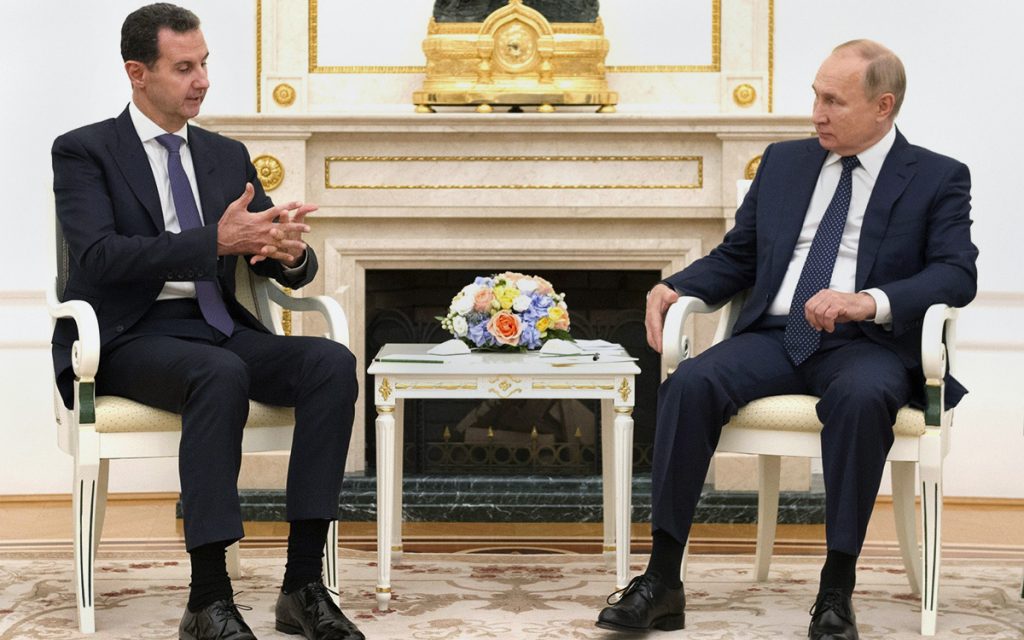
On Tuesday, March 14, Syrian President Bashar al-Assad arrived in Moscow on a working visit. At the Vnukovo government terminal, the representative Syrian delegation was met by the special representative of the President of Russia for the Middle East and Africa, Deputy Foreign Minister Mikhail Bogdanov. Assad’s visit to Russia was covered publicly and in real-time for the first time – before the Syrian leader’s trips, under Western sanctions, were closed. Assad last visited Moscow on September 13, 2021. On the same day, in the evening, he had talks in the Kremlin with Vladimir Putin, but the message about the meeting was published the next day.
Key statements of the parties:
- Putin: “Thanks to our joint efforts and the decisive contribution of the Russian Armed Forces in Syria, significant results have been achieved in the fight against international terrorism. This makes it possible to stabilise the socio-economic, domestic political situation.”
- Putin: “Over the past year, a seven per cent growth in trade was recorded. Next year we are celebrating the 80th anniversary of establishing diplomatic relations between our countries.”
- Assad: “I want to express to you the gratitude of the Syrian people for your steadfast position, for the responsible position of the Russian Federation in the international arena. These positions come from the sovereignty of the Syrian Arab Republic and the unity of its lands.”
- Assad: “Now I want to take a moment because this is my first visit since the [start] [so-called] “special operation” in Ukraine, and repeat the Syrian position in support of this special operation against neo-Nazis and old Nazis. I say “old” and “new Nazis” because the West, just as it accepted the old Nazis in its land, [so] now it has begun to support them, at present.”
Outcomes and outlook:
The arrival of Bashar al-Assad in Moscow is symbolic. Putin emphasises that he does not leave Syria and is ready to continue supporting the Assad regime even though the focus of the main events has shifted to Ukraine. Syria is a strategically important region from Russia’s point of view. It is vital that this visit took place on the eve of the visit of Chinese leader Xi Jinping. Obviously, the Syrian topic will be raised during the meeting of the heads of the Russian Federation and the People’s Republic of China. This is all the more important against the backdrop of China’s major diplomatic success – achieving peace in relations between Saudi Arabia and Iran (Iran is one of the main interests in the Syrian conflict, and Saudi Arabia is one of the main factors of peace and stability in the region).
Thus, Assad’s visit should be viewed not as a routine diplomatic action but as an essential element of the Greater Anti-West system currently being built. Moreover, Assad did not come on his own but with an extended delegation of ministers (Minister of Foreign Affairs and Compatriot Affairs Faisal Mikdad, Minister of Presidency Affairs – Co-Chairman of the Standing Russian-Syrian Commission on Trade, Economic, Scientific and Technical Cooperation Mansour Azzam, Minister of Economy and Foreign Trade Minister Mohamad Samer Al-Khalil, Minister of Defense Ali Abbas, Minister of Finance Keenan Yagi, Chairman of the Commission for Planning and International Cooperation Fadi Al-Khalil, Secretary General of the Council of Ministers Qais Khudr).
Also, there is every reason to believe that the agreements within the framework of the grain deal also concerned Turkey’s actions in the Syrian issue. As Ascolta wrote earlier, it was important for Putin to get Erdogan’s full support in the negotiation process around Syria (negotiations between Iran, Russia and Turkey have been ongoing since 2017), which will provide an opportunity to demonstrate to China the ability to resolve such issues.
6. Joint military exercises of Russia, China and Iran
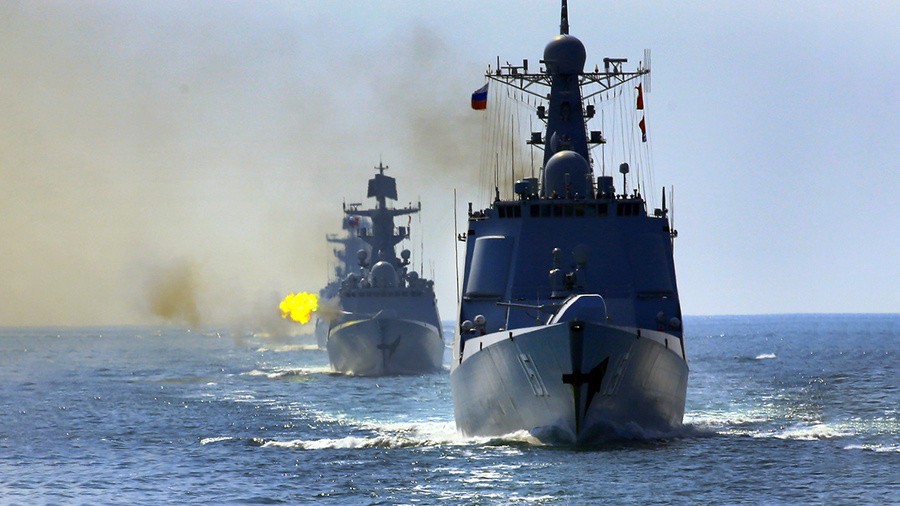
On Friday, March 17, joint naval exercises of Russia, China and Iran began in the Arabian Sea. The manoeuvres called “Marine Security Belt-2023” occur near the port of Chahbahar in Iran. Among the ships taking part in the exercises are the Russian frigate Admiral Gorshkov, equipped with Zircon hypersonic missiles, and the medium sea tanker Kama. In addition, the destroyer of the naval forces of the People’s Liberation Army of China “Nanjing”, the Iranian frigates “Sahand” and “Jamaran”, the corvette “Bayandor” and other ships are also participating. As part of the maritime stage of the exercises, the participants will work out the formation of an interethnic detachment of warships, joint manoeuvring, and artillery firing both during the day and at night. Also, an episode on the release of a captured ship, assistance to vessels in distress at sea and several other tasks will be worked out.
Outcomes and outlook:
The military exercises of Russia, China and Iran in the Persian Gulf, which were announced quite suddenly, are a response to the activation of NATO in the Mediterranean and Indian Ocean regions. We may be dealing with an emerging new military-political alliance preparing to challenge NATO.
It is important to note that this is the second naval manoeuvre conducted by Russia and China this year. Last month they passed off the coast of South Africa with the participation of the South African naval forces. Naval capabilities, artillery exercises, and simulated release of captured ships are being worked out during the exercises.
The possibility of signing a military-political agreement between Russia and China and Russia and Iran has long been discussed. But now we are talking about the triple format. In the future, other countries may join this alliance, and this will be a real challenge for NATO and the United States in the region – with the possibility of extending interests and actions to other regions (for example, the Pacific, which will lead to a clash of interests with entities such as QUAD and AUKUS).
Also, according to information that requires additional confirmation, consultations on the possibility of creating a military bloc based on BRICS have now intensified.
7. Lloyd Austin’s talks with Sergei Shoigu

On Tuesday, March 14, a telephone conversation took place between Pentagon Chief Lloyd Austin and Russian Defense Minister Sergei Shoigu. Its central theme is the crash of an American UAV over the Black Sea, which occurred due to the actions of Russian fighters. The Russian department said that the American side initiated the conversation. Later, this information was confirmed by the American side.
Key statements of the parties:
- On March 14, Pentagon Speaker Patrick Ryder said US Secretary of Defense Lloyd Austin had not spoken to his Russian counterpart Sergei Shoigu about the US Reaper drone crash over the Black Sea.
- On March 15, Sergei Shoigu reported on the conversation that had taken place with his American colleague. Shoigu told Austin that the cause of the incident was “the actions of the United States in non-compliance with the Russian Federation’s declared flight restriction area.” At the same time, Shoigu said Russia “is not interested in escalation” but intends to continue to “react to provocations.”
- Austin confirmed the conversation and stated that he had discussed with Shoigu the MQ-9 Reaper drone crash in the Black Sea. He told the Russian minister that the US would continue to fly where international law allowed.
Outcomes and outlook:
The talks between the heads of the military departments of Russia and the United States, caused by the incident with the American reconnaissance UAV, are engaging in themselves because this is, in fact, the first contact between the United States and Russia at the level of defence ministers since the start of hostilities by the Russian Federation in Ukraine. The restoration of communication is a good sign since the combination of such contacts could lead to a general detente of the situation, as well as to the resumption of negotiations on “strategic stability” (the violation of “strategic stability” in 2022 has already led to a war against Ukraine and the collapse of the European and world security system ).
Ascolta does not have reliable information about the full content of the conversation and the topics raised, but it can be assumed that the crashed UAV was just one of the reasons for such contact.
In any case, this conversation took place on the eve of Xi Jinping’s visit to Moscow, the start of joint military exercises between Russia, China and Iran, and several other equally important events in the geopolitical arena. It should be assumed that the result of the conversation will be demonstrated shortly.
8. Vladimir Putin’s speech at the RUIE
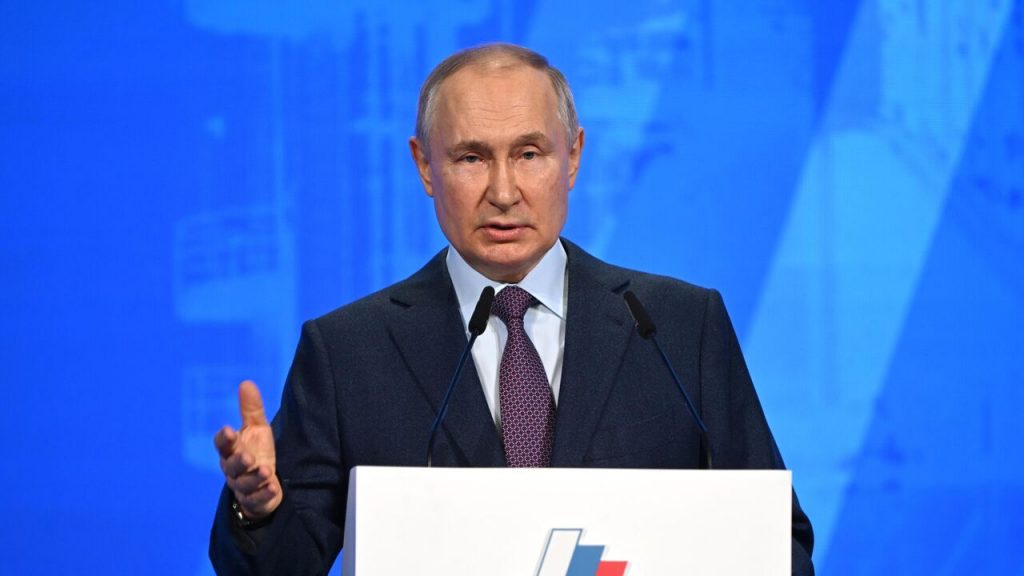
On Thursday, March 16, Vladimir Putin took part in the annual congress of the Russian Union of Industrialists and Entrepreneurs (RUIE), where he addressed the congress participants.
Key theses:
- “Let me remind you that the maximum decline in Russia’s GDP last year was recorded in June, which, in my opinion, is 4.7 per cent. The reasons are known – it is the sanctions war, unprecedented challenges in the global economy and trade in the whole system of international relations, and these problems, as you know, were not created by us. Russia, and probably no other country in the world, has yet to face challenges in modern history. This is the basis, the cause, of what I have just said.”
- “We managed to compensate for the actual closure of Western markets, to expand Russia’s foreign trade contacts with the states of the rapidly growing regions of the world.”
- “In general, Russia’s foreign trade turnover for 2022 increased by 8.1 per cent, to $850 billion, including exports grew by almost 20 per cent, to 19.9 per cent, while imports decreased by almost 12 per cent to 11.7 per cent.”
- “According to estimates, already in April, we will reach the growth rate of retail turnover of at least five per cent, and in real terms”.
- “A year ago, Western authorities twisted the arms of their companies and forced some of them, many of them, to leave the Russian market. At that time, foreign analysts predicted a depression and a decline in the consumer sector, promised empty store shelves, a massive shortage of goods, and the failure of the service sector. However, life took a different course.”
- “Today in Russia, there are huge opportunities for almost any line of activity, for any business, for launching promising, long-term projects in the consumer market, in the high-tech sector, in tourism, and many other sectors of the economy.”
Outcomes and outlook:
One of the most critical moments in Putin’s speech at the RUIE was that the congress of the Russian Union of Industrialists and Entrepreneurs and Putin’s presence at it was ignored by several prominent business representatives – Vladimir Yevtushenkov, Suleiman Kerimov, Vadim Moshkovich, Leonid Mikhelson, Vagit Alekperov, Arkady Rotenberg, Vladimir Lisin, Gennady Timchenko, Alexey Miller, Igor Sechin, German Gref and others.
Some are in such close relations with Putin that they can afford not to attend general meetings. Some of them demonstrated their position. Especially when businesses found themselves in a difficult situation, and Putin offered to tighten their belts even more and help the Russian economy.
The fact that depressed business representatives came out of the closed part of the conversation with the president shows that an actual rebellion may soon ripen in the business environment. However, each of the “oligarchs” is afraid to repeat the fate of Khodorkovsky, Berezovsky, Gusinsky or Fridman (a representative of the disgraced Friedman, Herman Khan, was present at the congress). That is why they will only have to endure and wait for Putin’s promises of compensation to businesses to come true.
9. ICC’s tribunal warrant for Putin’s arrest
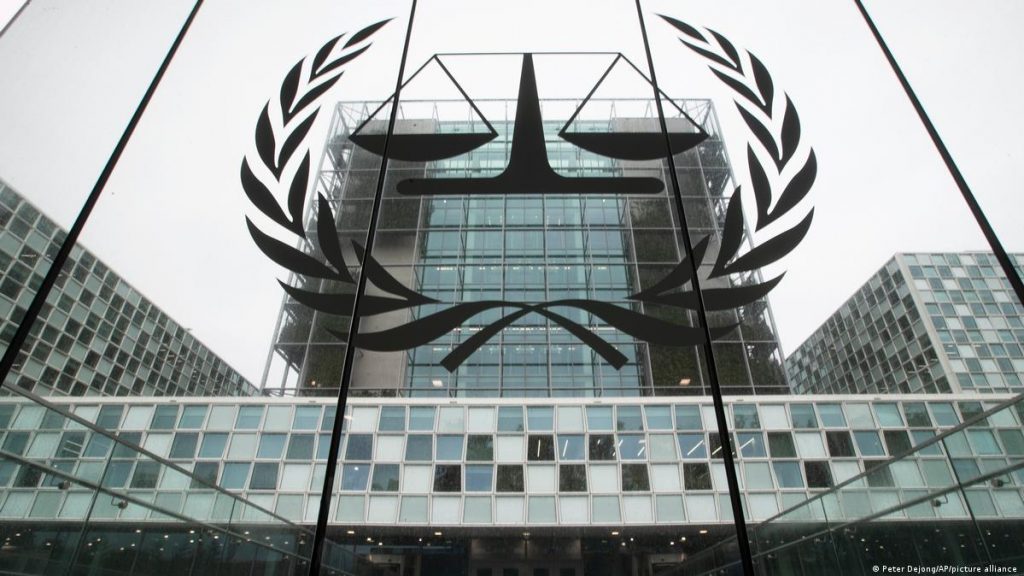
On Friday, March 17, the International Criminal Court (ICC) in The Hague issued Russian President Vladimir Putin an arrest warrant. The court suspects Putin of war crimes. In particular, the forcible deportation of children from the occupied territories of Ukraine to Russia. According to the ICC, there are sufficient grounds to believe that the President of Russia bears personal criminal responsibility for these crimes – directly, together with other persons or through other persons – and also for the fact that he “did not exercise proper control over civilian and military subordinates, who committed or allowed these acts and who were under his effective authority and control.”
A similar arrest warrant was issued against Maria Lvova-Belova, Commissioner for Children’s Rights under the President of the Russian Federation. The ICC ruling states that the court in The Hague “has sufficient grounds to believe that she bears individual criminal responsibility for the above crimes since she committed these acts directly, jointly with other persons and/or through other persons.”
Outcomes and outlook:
By and large, this is a symbolic decision that will not have direct legal consequences. In this case, it is essential to distinguish between the UN Hague Tribunal and the International Criminal Court, acting based on the Rome Statute. Neither Russia, the United States, nor Ukraine has ratified this statute.
Moreover, the Constitution of the Russian Federation has a norm that provides for the supremacy of federal legislation over international law. The US generally does not recommend its satellites to deal with the RS (for this reason, Ukraine is in no hurry to ratify the RS, although it undertook to do so when signing the association agreement with the EU). Trump once threatened ICC judges with arrests due to interference in the internal affairs of the United States.
Of course, tomorrow, the police will not land in Moscow to arrest Putin and the children’s ombudsman. The court’s decision was made more for propaganda and political purposes – to show another middle finger towards Russia.
Consequences? Most likely, Orban (Hungary has ratified the Rome Statute) will be exposed to the fact that he communicates with Putin. Or they will try to put pressure on some BRICS states. But it must be taken into account that the warrant is not yet a verdict, not a recognition of Putin as a criminal. This is what the states that recognise the Rome Statute but continue to communicate with the Russian leader will appeal to. And secondly, a situation may arise in which countries quickly denounce old agreements and obligations when choosing between ties with Russia and devotion to the Rome Statute.
It can be assumed that Russia will be able to stage several precedents shortly. With the tacit support of China. And even with the silence of the United States. There is another aspect: from now on, it can be accurately predicted that in 2024 there will be no “successor” operation, and Putin will be nominated for another presidential term. Winning an election and winning another presidential term is the best immunity from persecution by the International Criminal Court.
10. Putin’s visit to Crimea and Mariupol

On Saturday, March 18, on the anniversary of Russia’s annexation of Crimea and Sevastopol, Vladimir Putin visited the Tauric Chersonese historical and archaeological park. Accompanied by the “governor” of Sevastopol, Mikhail Razvozhaev, and Metropolitan of Pskov and Porkhov, Chairman of the Patriarchal Council for Culture Tikhon (Shevkunov), Putin examined the children’s centre Korsun, a branch of Artek, and the children’s art and aesthetic centre that were opened on the territory of the historical and archaeological park that form an educational cluster.
On the same day, Putin visited the occupied Mariupol, where he got acquainted with the progress of the city’s restoration and improvement and talked with its residents. It is noted that he flew to Mariupol by helicopter. Then, at the car’s wheel, he travelled around several city districts and made several stops.
Outcomes and outlook:
Putin’s unexpected trip to Crimea and Mariupol demonstrated that Russia would not give up these territories and intends to defend them with all its might. The visit of the first person of the aggressor state to the occupied territories is a symbolic gesture. The important point is that these kinds of visits do not happen spontaneously. The US intelligence community was clearly informed of Putin’s upcoming visit (just as the Russian authorities were aware of Biden’s visit to Kyiv). That is, a certain courtesy is observed, and the parties do not want to aggravate the situation to a critical one. At the same time, in the public plane, this event counterbalanced Biden’s visit to Kyiv.
Most likely, the revival of contacts between the military departments of the United States and Russia after the incident with the reconnaissance aircraft played a role in the situation around Putin’s arrival. Putin signals that Russia is ready for a Ukrainian military counter-offensive on the Azov coast and Crimea. Moreover, his arrival is a challenge to the Armed Forces of Ukraine, an attempt to provoke an acceleration of the offensive itself on the part of Ukraine (now the Ukrainian and Russian sides are waiting to see who will take the first step and go on the offensive to understand the enemy’s plan and seize the initiative).
At the same time, from a political point of view, Putin once again tried to legalise the occupied territories within the Russian Federation. Despite the ICC warrant and several other accusations, he arrived in Ukraine and demonstrated that he was not afraid of Western sanctions and arrests. In this case, the confusion of Kyiv was very indicative, which was not informed by the Western intelligence about the planned visit.
11. Putin’s article on Chinese-Russian relations
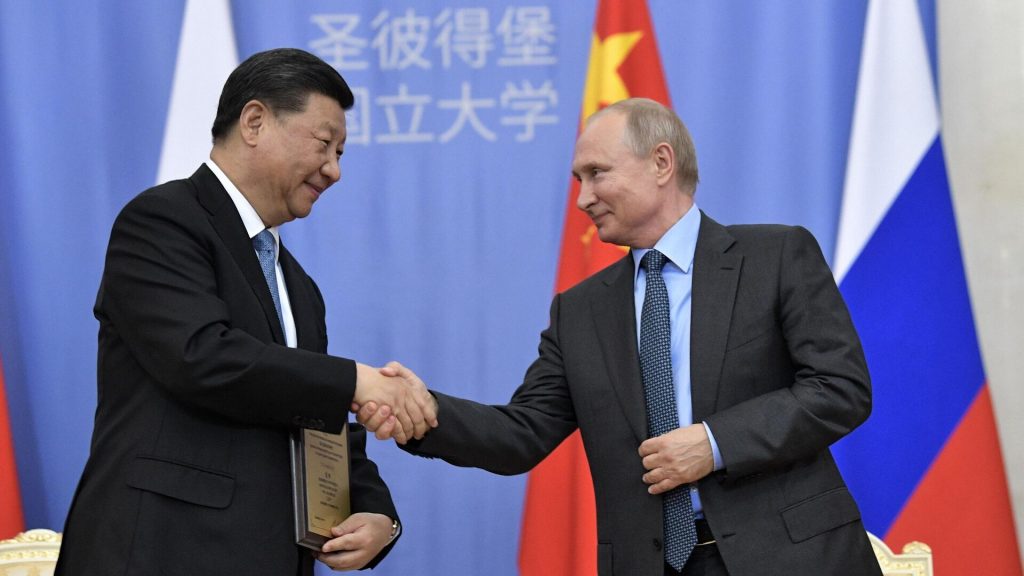
On Sunday, March 19, on the eve of Chinese leader Xi Jinping’s visit to Moscow, the Chinese edition of People’s Daily published an article by Vladimir Putin titled “Russia and China – a partnership looking to the future.” In the previously announced material, Putin described the current relations between the two states and also complimented his Chinese colleague.
Key theses:
- We have high expectations for the upcoming negotiations. We do not doubt that they will give a powerful new impetus to the entire range of bilateral cooperation. It is also a great opportunity to see a good old friend with whom we have the warmest relationship.
- We met Comrade Xi Jinping in March 2010, when he came to Moscow as the head of a representative Chinese delegation. Our first meeting was very businesslike and, at the same time, sincere and friendly. This style of communication personally impresses me deeply.
- President Xi Jinping and I have met about 40 times and have always found time and opportunity to communicate in various official formats and a “no tie” setting.
- One of our priorities is the trade and economic partnership. By the end of 2022, the solid bilateral trade doubled and reached $185 billion. This is a new record. And we have every reason to believe that the $200 billion bar we set with President Xi Jinping will be exceeded not in 2024 but already this year.
- The Russian-Chinese main gas pipeline “Power of Siberia” in terms of its scale, without exaggeration, has become the “deal of the century”.
- Russia and China power with ancient original traditions and colossal cultural heritage. And now that all pandemic-related restrictions on mutual contacts have been lifted, it is essential to increase humanitarian and tourist exchanges as soon as possible, thereby strengthening the Russian-Chinese partnership’s social base.
- Together with like-minded people, our countries are consistently advocating the formation of a more just multipolar world order based on international law and not on specific “rules” that serve the needs of the “golden billion”.
- We see that the external geopolitical landscape is undergoing dramatic changes. The “collective West” clings increasingly desperately to archaic dogmas, to its elusive dominance, putting the fate of entire states and peoples at stake.
- Russia is open to a politico-diplomatic settlement of the Ukrainian crisis. However, back in April 2022, the peace talks were not terminated by us. The future of the peace process depends solely on the readiness for a serious conversation, taking into account the prevailing geopolitical realities.
- It is Russian-Chinese relations that today act as the cornerstone of regional and global stability, stimulate economic growth, and serve as a guarantor of a positive agenda in international affairs.
Outcomes and outlook:
At first glance, Putin’s article has the character of traditional “vignettes” published in official publications on the eve of the arrival of distinguished guests. With two differences: firstly, the article’s publication in the People’s Daily would be justified in the event of Putin’s visit to China (in this case, Xi Jinping’s “vignette” in Rossiyskaya Gazeta could be discussed before the visit).
Secondly, a third of the article is an appeal to friendship, personal relationships and experiences of Putin and Xi. In this regard, the text is by no means ordinary. After briefly describing the joint achievements and the state of Russian-Chinese relations, Putin moves on to the topics planned for the talks.
Particularly striking is the extent to which Russia focuses attention in the eyes of Chinese society on the war in Ukraine. Putin openly asks for Chinese mediation, promotes his vision of the situation, and emphasises Russia’s readiness for negotiations (while pointing out that all the blame for the breakdown of negotiations lies with the Ukrainian side and its allies). Thus, one can understand that the Ukrainian topic will be quite actively discussed during the talks between Putin and Xi, as well as the issues of Russian-Chinese cooperation in the context of the collapse of the global world and confrontation with the West.
It is worth noting that Xi Jinping’s response material, also announced on the eve of his visit to Moscow, is expected to be published on Monday.
12. Telephone conversation between Vladimir Putin and President of Belarus Alexander Lukashenko
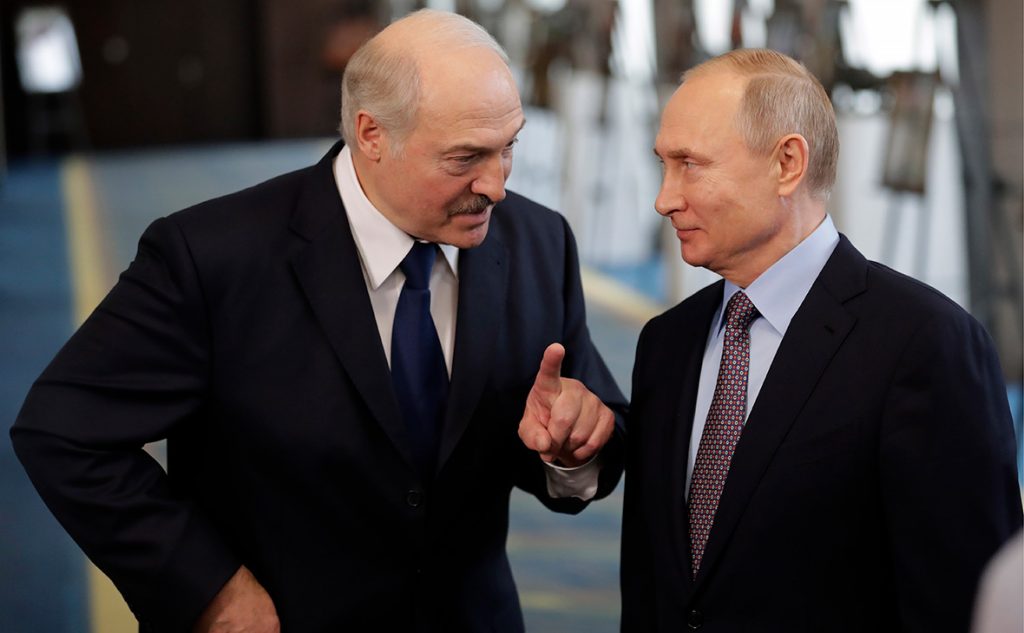
On Friday, March 17, the Presidents of Russia and Belarus had a telephone conversation. According to official data, during the conversation, issues of trade and economic cooperation between the two countries and substantive matters related to preparing the meeting of the Supreme State Council of the Union State of Russia and Belarus scheduled for April were discussed. Also, the topics of possible interaction in the framework of the work on creating international transport corridors were also considered.
Outcomes and outlook:
The telephone conversation between Putin and Lukashenko is endowed with special meanings on the eve of Xi Jinping’s visit to Moscow. Lukashenko himself is maximally integrated into implementing the Chinese policy in Europe and increasingly demonstrates the role of a mediator between Beijing and Europe.
According to reports, the most critical issue discussed during Putin’s conversation with Lukashenko was creating an international transport corridor – the northern branch of the “Silk Road”, which is one of China’s most active projects in the region.
At the same time, it is worth assuming that Lukashenka can become a mediator in Russia’s relations with the West and with Ukraine. His recent visit to China demonstrated that he remains vital in building Chinese influence in the region for Xi Jinping. At the same time, for Lukashenko, such contact with Beijing provides an opportunity for manoeuvres in the implementation of the Union State. Also, it allows him to maintain conditional neutrality in the [so-called] “SMO”.
13. Meeting of the Security Council of the Russian Federation

On Friday, March 17, Vladimir Putin held an operational meeting via videoconference with the permanent members of the Security Council of the Russian Federation. The meeting was attended by Prime Minister Mikhail Mishustin, Chairman of the State Duma Vyacheslav Volodin, Deputy Chairman of the Security Council Dmitry Medvedev, Chief of Staff Anton Vaino, Secretary of the Security Council Nikolai Patrushev, Foreign Minister Sergei Lavrov, Defense Minister Sergei Shoigu, Director of the Federal Security Service Alexander Bortnikov, Director of the Foreign Intelligence Service Sergei Naryshkin, Special Representative of the President for Environmental Protection, Ecology and Transport Sergei Ivanov.
Outcomes and outlook:
This meeting was held in the already familiar-closed mode. True, in the beginning, Putin announced Lavrov’s report on the course of cooperation in the Caspian region. However, it is noteworthy that the day before, Putin had a telephone conversation with Azerbaijani President Ilham Aliyev, during which the development of transport and logistics ties in the region was discussed.
According to Ascolta, as in the case of Lukashenko, we are talking about the final coordination of processes for implementing transport routes from China to Europe (the “Silk Road”). Moreover, the very same meeting of the Security Council of the Russian Federation was also dedicated to the upcoming visit of Xi Jinping to Moscow, as a result of which many economic and logistical processes could be launched.
It is also important to note that meetings of the Security Council of the Russian Federation, which is held every week, have recently become much more frequent (previously, Putin held such meetings much less often). This indicates the accumulation of strategic problems that require immediate solutions at the highest level. We are dealing with yet another proof that not everything is as good in Russia as Putin says in his regular lectures on history and economics.

